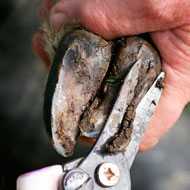Digital dermatitis present on sheep and cattle hoof blades

Digital dermatitis was found on 100 per cent of sheep blades.
New research has revealed a possible method for the transfer of digital dermatitis (DD) between cows and farms.
Scientists at the University of Liverpool have discovered that DD was present on hoof knives used on cattle and sheep following trimming.
The project investigated if DD Treponeme, the bacteria type now widely accepted as responsible for the skin infection, can be present on equipment used to trim hooves. Digital dermatitis is an ulcerative lesion that causes lameness in cattle. It is known that this bacteria causes skin infection by entering into the hair follicle but less is known about how the bacteria survives and is transmitted in the environment.
The research team, led by Dr Nicholas Evans and Professor Stuart Carter of the University of Liverpool in collaboration with veterinarian Roger Blowey, tested trimming equipment used on cattle and sheep with digital dermatitis before and after it was disinfected. After trimming, DD was present on 97 per cent of cattle blades and 100 per cent of sheep blades. This was reduced to 29 per cent and 46 per cent respectively after disinfection.
Dr Evans said; "It has long been considered that digital dermatitis was spread in slurry, which we have some evidence for and are continuing to investigate, but now, for the first time, we have discovered the digital dermatitis bugs in the farm environment. However, the high detection rate of digital dermatitis bacteria on trimming blades soon after trimming cattle and sheep hooves from DD cases suggests this may be a significant and worrying route for the transmission of this infectious condition."
Dr Jenny Gibbons, DairyCo research and development manager, added: “This DairyCo and EBLEX-funded study could help farmers, vets and hoof trimmers to understand more about the transmission of digital dermatitis between cows and farms. A logical precaution to limit the spread is to disinfect hoof trimming equipment between animals and between farms.”



 RCVS Knowledge has welcomed Professor Peter Cockcroft as editor-in-chief for Veterinary Evidence.
RCVS Knowledge has welcomed Professor Peter Cockcroft as editor-in-chief for Veterinary Evidence.